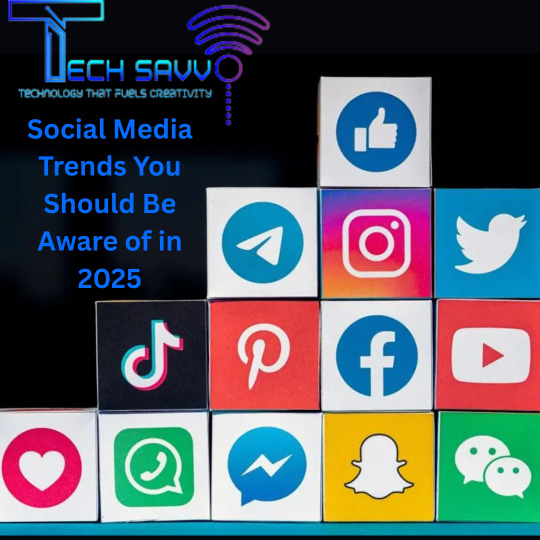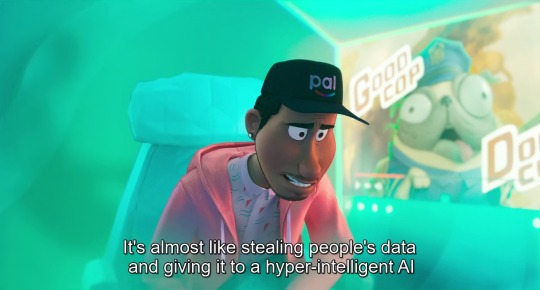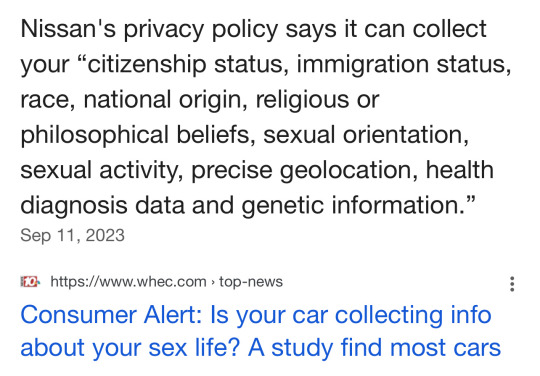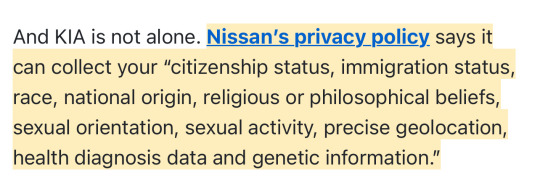#Privacy Data
Explore tagged Tumblr posts
Text
June 11 note - We’ve updated this post with even more tools!
Every day, there seem to be more reasons to break up with Google.

So we’ve rounded up a bunch of privacy-centric alternatives for all your deGoogling needs.
Check out the full list over on the blog!
- The Ellipsus Team xo
49K notes
·
View notes
Text
Social Media Trends You Should Be Aware of in 2025

Social Media Trends You Should Be Aware of in 2025
The social media landscape in India is a constantly evolving and dynamic force, driven by a large and digitally savvy user base. As we head into 2025, brands must evolve with the emerging trends to remain relevant, engage meaningfully, and increase conversions. Here are 10 significant social media trends to observe, along with examples from the Indian market:
1. The Dominance of Short-Form Video Content
Platforms for short-form videos, such as Instagram Reels, YouTube Shorts, and TikTok (which is banned in India, yet its influence on content style is still felt), remain at the forefront. Their brief, captivating format is designed to cater to shorter attention spans, offering brands a potent avenue to tell quick stories, highlight products, and connect with their audiences.
Example: Myntra frequently leverages Instagram Reels to showcase new fashion collections, styling tips, and influencer collaborations. Their short, visually appealing videos with trending audio effectively capture the attention of fashion-conscious consumers and drive traffic to their platform. Similarly, Zomato often uses short, humorous videos on Instagram and YouTube Shorts to promote offers, highlight quirky food content, and engage with its audience.
2. The Rise of Social Commerce
Social media platforms have evolved beyond mere discovery; they are now essential sales channels. Social commerce enables users to make purchases directly within the app, simplifying the buying process and enhancing the overall experience. Live commerce, especially, is experiencing considerable growth.
Example: Meesho, a prominent e-commerce platform in India, has heavily invested in live shopping sessions. Sellers on Meesho showcase products in real-time, interact with customers, answer queries, and facilitate direct purchases during live streams. Brands like Nykaa also frequently host live shopping events on Instagram and their platforms, collaborating with beauty influencers to demonstrate products and offer exclusive deals.
3. Hyper-Personalization at Scale with AI
Standard advertising methods are fading; hyper-personalized content is now the focus. Brands are employing AI and real-time data to create highly individualized content, product recommendations, and experiences that align with the specific behaviors and preferences of users.
Example: E-commerce giants like Flipkart and Amazon India utilize AI extensively to personalize user feeds, recommend products, and serve targeted ads based on browser history, past purchases, and demographic data. Beyond e-commerce, content platforms like Hotstar also use AI to personalize recommendations for movies and shows, enhancing user engagement.
4. The Expanding Creator Economy and Authentic Influencer Marketing
India's creator economy is thriving, with digital creators having a significant impact on consumer spending patterns.
Brands are shifting towards establishing long-term relationships with authentic, relatable micro- and nano-influencers who genuinely engage with their niche audiences, rather than relying solely on celebrity endorsements.
Example: Brands like Mama earth have built a strong presence by collaborating with a wide network of parenting and lifestyle influencers who create genuine, user-generated content featuring their products. Similarly, many D2C (Direct-to-Consumer) brands are partnering with creators on platforms like Instagram and YouTube to showcase their products through honest reviews and engaging storytelling.
5. Increased Adoption of Augmented Reality (AR) Experiences
Augmented Reality, or AR, is evolving from a mere curiosity into a vital tool for brands. It's helping them create engaging, interactive experiences for their customers. Cool new features like virtual try-ons, interactive ads, and AR filters are making it easier for people to discover products and are making the overall brand experience more captivating.
Example: Lenskart has successfully implemented AR technology, allowing users to virtually try on spectacles and sunglasses using their phone cameras before making a purchase. Beauty brands like Lakme are also experimenting with AR filters on Instagram, allowing users to try on different makeup looks virtually.
6. The Rise of Private Communities and Niche Platforms
While public social feeds still play a crucial role, users are more and more interested in connecting within smaller, private communities.
Brands are forming exclusive groups on platforms such as WhatsApp, Telegram, or Discord to nurture deeper loyalty, share exclusive content, and engage in more significant conversations.
Example: Many Indian brands, particularly in sectors like fitness, education, and hobbies, are creating private WhatsApp or Telegram groups for their most loyal customers. For instance, a yoga studio might have a private group for its members to share tips, get exclusive content, and interact directly with instructors.
7. Sustainability and Social Responsibility in Brand Storytelling
Consumers, particularly those from Gen Z, are increasingly aware of environmental and social concerns. Brands that authentically integrate sustainability and social responsibility into their fundamental principles and openly share these initiatives on social media will earn trust and loyalty.
Example: Fabindia often highlights its commitment to sustainable sourcing and supporting artisan communities through its social media content. Similarly, brands like Patagonia India (though an international brand, their Indian presence emphasizes this) actively promote environmental causes and their sustainable practices on their social channels, resonating with eco-conscious consumers. The Indian government's "One Nation, One Mission: End Plastic Pollution" campaign for World Environment Day 2025 also highlights how large-scale social media campaigns are being utilized to drive awareness and action on sustainability.
8. Conversational Commerce and AI Chatbots
AI-driven chatbots are evolving in complexity, managing customer inquiries, offering product suggestions, and even enabling purchases directly through messaging platforms. This ensures immediate customer assistance and a smooth shopping experience.
Example: Many e-commerce players and service providers in India are integrating AI chatbots on their websites and social media messaging platforms (like WhatsApp Business). For example, JioMart utilizes chatbots to assist customers with order placement, tracking, and basic queries. Banks and telecom companies also heavily rely on chatbots for initial customer support on platforms like Facebook Messenger and WhatsApp.
9. Gamification and Interactive Content
Brands are getting more creative on social media to fight off audience burnout and grab attention. They're doing this by adding game-like features and interactive stuff to their posts. Things like quizzes, polls, challenges, and even augmented reality games are making people want to interact more and making the whole experience with the brand more enjoyable.
Example: Swiggy and Ola frequently use in-app gamification and social media challenges to engage users and offer discounts or rewards. Brands might run polls on Instagram Stories asking for preferences, or create interactive quizzes related to their products, encouraging participation and data collection.
10. The Exploration of Decentralized Social Media (Web3)
The concept of decentralized social media is gaining traction in India, despite still being in its infancy. This is due to concerns about algorithmic governance, content restriction, and data privacy on traditional platforms. Companies might start looking into these platforms for early adopters and particular communities.
Example (Early Stage/Conceptual): While no major Indian brand has fully transitioned to a decentralized social media strategy yet, the underlying principles of user ownership and transparency could influence future engagement. We might see brands experimenting with NFTs for loyalty programs or engaging with communities on blockchain-based platforms like Lens Protocol (if they gain significant traction in India). The focus here would be on building direct, transparent relationships with highly engaged users who value data privacy and freedom of expression.
Conclusion:
Ultimately, 2025 holds great promise for social media marketing in India. Brands that harness these trends – from the engaging capabilities of short-form video and AR to the customized experiences provided by AI and the genuine connections of the creator economy – will be best equipped to flourish in this vibrant digital landscape.
#AI Integration#Social Commerce#Short Video#Creator Economy#Hyper Personalization#Community building#Authenticity Transparency#Privacy Data
1 note
·
View note
Text
I think every computer user needs to read this because holy fucking shit this is fucking horrible.
So Windows has a new feature incoming called Recall where your computer will first, monitor everything you do with screenshots every couple of seconds and "process that" with an AI.
Hey, errrr, fuck no? This isn't merely because AI is really energy intensive to the point that it causes environmental damage. This is because it's basically surveilling what you are doing on your fucking desktop.
This AI is not going to be on your desktop, like all AI, it's going to be done on another server, "in the cloud" to be precise, so all those data and screenshot? They're going to go off to Microsoft. Microsoft are going to be monitoring what you do on your own computer.
Now of course Microsoft are going to be all "oooh, it's okay, we'll keep your data safe". They won't. Let me just remind you that evidence given over from Facebook has been used to prosecute a mother and daughter for an "illegal abortion", Microsoft will likely do the same.
And before someone goes "durrr, nuthin' to fear, nuthin to hide", let me remind you that you can be doing completely legal and righteous acts and still have the police on your arse. Are you an activist? Don't even need to be a hackivist, you can just be very vocal about something concerning and have the fucking police on your arse. They did this with environmental protesters in the UK. The culture war against transgender people looks likely to be heading in a direction wherein people looking for information on transgender people or help transitioning will be tracked down too. You have plenty to hide from the government, including your opinions and ideas.
Again, look into backing up your shit and switching to Linux Mint or Ubuntu to get away from Microsoft doing this shit.
44K notes
·
View notes
Text
From instructions on how to opt out, look at the official staff post on the topic. It also gives more information on Tumblr's new policies. If you are opting out, remember to opt out each separate blog individually.
Please reblog this post, so it will get more votes!
#third party sharing#third-party sharing#scrapping#ai scrapping#Polls#tumblr#tumblr staff#poll#please reblog#art#everything else#features#opt out#policies#data privacy#privacy#please boost#staff
47K notes
·
View notes
Text
If you have ever used 23andMe, they have now filed for bankruptcy and will be asset stripped. Delete your account information as soon as possible.
3K notes
·
View notes
Text
youtube
Data privacy refers to the protection of personal and sensitive information collected, processed, and stored by individuals, organizations, or entities. It encompasses the set of practices, policies, regulations, and technologies designed to ensure that individuals have control over their personal data and that this data is handled in a way that respects their rights, maintains its confidentiality, integrity, and availability, and prevents unauthorized access, use, or disclosure.
Data privacy encompasses a range of concepts and principles that collectively aim to safeguard individuals' rights and interests in their personal information. It involves understanding and implementing measures to control who has access to your data, how it is used, and for what purposes. This extends to both online and offline contexts, as more and more of our activities and interactions occur in the digital realm.
Key aspects of data privacy include: Data Collection: Organizations collect various types of data from individuals, including names, addresses, phone numbers, email addresses, and more. Data privacy emphasizes the need for transparent and informed consent before collecting personal data, ensuring individuals are aware of how their data will be used.
Data Storage and Security: Personal data should be securely stored to prevent unauthorized access, breaches, or leaks. Organizations are expected to implement robust cybersecurity measures to safeguard sensitive information.
Data Processing: When organizations process personal data, such as analyzing it to gain insights or using it for targeted advertising, they must do so within the bounds of applicable laws and regulations. Individuals have the right to know what processing is taking place and to object to certain types of processing.
Data Sharing: Personal data should not be shared with third parties without explicit consent from the individual. This includes sharing data with advertisers, marketers, or other businesses.
User Control: Individuals should have the ability to access their own data, correct inaccuracies, and, in some cases, request the deletion of their data. This principle is enshrined in regulations like the European Union's General Data Protection Regulation (GDPR).
Understanding your digital rights in terms of data privacy empowers you to make informed decisions about sharing your personal information, using online services, and interacting in the digital world while maintaining a reasonable level of control over your own data.
What is Data Privacy? Understanding Your Digital Rights
#what is data privacy#understanding your digital rights#data privacy#data protection#data privacy definition#data security#digital rights#LimitLess Tech 888#online privacy#internet privacy#tech privacy#data privacy and security#data and privacy#dark side of data privacy#data privacy protection#privacy data#data protection and privacy#digital rights management#online privacy and security#data privacy explained#data privacy policy#data privacy awarness#Youtube
0 notes
Text
youtube
Data privacy refers to the protection of personal and sensitive information collected, processed, and stored by individuals, organizations, or entities. It encompasses the set of practices, policies, regulations, and technologies designed to ensure that individuals have control over their personal data and that this data is handled in a way that respects their rights, maintains its confidentiality, integrity, and availability, and prevents unauthorized access, use, or disclosure.
Data privacy encompasses a range of concepts and principles that collectively aim to safeguard individuals' rights and interests in their personal information. It involves understanding and implementing measures to control who has access to your data, how it is used, and for what purposes. This extends to both online and offline contexts, as more and more of our activities and interactions occur in the digital realm.
Key aspects of data privacy include: Data Collection: Organizations collect various types of data from individuals, including names, addresses, phone numbers, email addresses, and more. Data privacy emphasizes the need for transparent and informed consent before collecting personal data, ensuring individuals are aware of how their data will be used.
Data Storage and Security: Personal data should be securely stored to prevent unauthorized access, breaches, or leaks. Organizations are expected to implement robust cybersecurity measures to safeguard sensitive information.
Data Processing: When organizations process personal data, such as analyzing it to gain insights or using it for targeted advertising, they must do so within the bounds of applicable laws and regulations. Individuals have the right to know what processing is taking place and to object to certain types of processing.
Data Sharing: Personal data should not be shared with third parties without explicit consent from the individual. This includes sharing data with advertisers, marketers, or other businesses.
User Control: Individuals should have the ability to access their own data, correct inaccuracies, and, in some cases, request the deletion of their data. This principle is enshrined in regulations like the European Union's General Data Protection Regulation (GDPR).
Laws and regulations related to data privacy vary by country, with some of the most prominent ones being the GDPR in Europe, the California Consumer Privacy Act (CCPA) in the United States, and various other regional and national regulations.
Understanding your digital rights in terms of data privacy empowers you to make informed decisions about sharing your personal information, using online services, and interacting in the digital world while maintaining a reasonable level of control over your own data.
#dataprivacy#dataprotection#digitalrights#datasecurity#limitlesstech#dataprivacydefinition#onlineprivacy#internetprivacy#techprivacy#dataprivacyandsecurity#dataandprivacy#dataprivacyexplained#dataprivacypolicy#dataprivacyawarness
What is Data Privacy? Understanding Your Digital Rights
#what is data privacy#understanding your digital rights#data privacy#data protection#data privacy definition#data security#digital rights#LimitLess Tech 888#online privacy#internet privacy#tech privacy#data privacy and security#data and privacy#dark side of data privacy#data privacy protection#privacy data#data protection and privacy#digital rights management#online privacy and security#data privacy explained#data privacy policy#data privacy awarness#Youtube
0 notes
Text






(from The Mitchells vs. the Machines, 2021)
#the mitchells vs the machines#data privacy#ai#artificial intelligence#digital privacy#genai#quote#problem solving#technology#sony pictures animation#sony animation#mike rianda#jeff rowe#danny mcbride#abbi jacobson#maya rudolph#internet privacy#internet safety#online privacy#technology entrepreneur
12K notes
·
View notes
Text
🗣️ This is for all new internet connected cars

A new study has found that your car likely knows more about you than your mom. That is disconcerting, but what’s even more so is what is being done with your information. It’s all about the Benjamins. Our private information is being collected and sold.
The Mozilla Foundation, a non-profit that studies internet and privacy issues, studied 25 car manufacturers. And it found every manufacturer sold in America poses a greater risk to your privacy than any device, app or social media platform.
Our cars are rolling computers, many of which are connected to the internet collecting information about how you drive and where. New cars also have microphones and sensors that give you safety features like automatic braking and drowsy driver detection. Those systems are also providing information. Got GPS or satellite radio? Then your car likely knows your habits, musical and political preferences.
Did you download your car’s app which gives you access to even more features? Well that also gives your car access to your phone and all the information on it.
The study found that of the 25 car brands, 84% say they sell your personal data.
And what they collect is astounding.
One example the study sites is KIA’s privacy policy. It indicates the company collects information about your sexual activity. I initially didn’t believe it until I pulled KIA’s privacy policy and read it. And it’s right there in black and white. It says it collects information about your “ethnicity, religious, philosophical beliefs, sexual orientation, sex life, or political opinions.

And it says it can keep your info for “as long as is necessary for the legitimate business purpose set out in this privacy notice.”
Translation: Nissan can keep your information as long as they want to. And more than half of the manufacturers (56%) say they will share your information with law enforcement if asked.
(continue reading) more ↵
#politics#data mining#smart cars#spyware#privacy rights#surveillance state#new cars#big brother#nissan#kia#connected cars#consumer alert#panopticon
9K notes
·
View notes
Text

#palantir#violation of your freedom#unconstitutional#spying on everyone#all your data on private#republican assholes#maga morons#traitor trump#crooked donald#privacy violations#identity theft#Orwellian#dystopian
687 notes
·
View notes
Text
Infinitely funny whenever the media or government or some corporation tries to fearmonger to me about the Chinese government getting access to my private information.
Y'all have spent the last two decades drilling into me that I should have absolutely no expectation of privacy. No expectation of privacy from my own government, who are by far the entity most likely to use my information to really harm me. No expectation of privacy from advertisers who will do anything with that data, give it to anyone, if they think it will make them a few cents of profit. No expectation that anything I write, even in private documents that are never posted, won't be used to train machine learning models to let capital owners eliminate more workers and further consolidate their wealth and power. All that's just how it is and I have to accept it.
But apparently, unbeknownst to me, there is exactly one entity that does owe me an expectation of privacy, and it's not one that has any formal social or legal tie to me. Fascinating. I guess I have a lot to learn about privacy.
1K notes
·
View notes
Text
hey, privacy concerned folks,
DON'T USE BALENA ETCHER TO USB YOUR ISOs
As @tailsos-official stated in their blog post, it displays ads which is weird for a simple disk imaging tool and more important:
It shares your IP address, the file name of the image the model of the USB stick and a bunch of other things with the Balena company and third parties.
On Windows, use Rufus instead. It's pretty neat.
On Mac, use the Raspberry Pi Imager. It does its job. Or if you don't mind the terminal, use dd. It's built-in.
On Linux you can use dd, or whatever comes with your DE. Or whatever else you prefer. We got options.
You can also use Ventoy and just chuck all your ISOs on it. No need to reformat your usb drives again just for a new boot stick. One USB to rule them all.
sources under the cut
youtube
#linux#linuxposting#windows#microsoft#mac#macos#balena etcher#tailsos#tails os#privacy#data privacy#internet privacy#Youtube
454 notes
·
View notes
Text
Ad-tech targeting is an existential threat

I'm on a 20+ city book tour for my new novel PICKS AND SHOVELS. Catch me TORONTO on SUNDAY (Feb 23) at Another Story Books, and in NYC on WEDNESDAY (26 Feb) with JOHN HODGMAN. More tour dates here.

The commercial surveillance industry is almost totally unregulated. Data brokers, ad-tech, and everyone in between – they harvest, store, analyze, sell and rent every intimate, sensitive, potentially compromising fact about your life.
Late last year, I testified at a Consumer Finance Protection Bureau hearing about a proposed new rule to kill off data brokers, who are the lynchpin of the industry:
https://pluralistic.net/2023/08/16/the-second-best-time-is-now/#the-point-of-a-system-is-what-it-does
The other witnesses were fascinating – and chilling, There was a lawyer from the AARP who explained how data-brokers would let you target ads to categories like "seniors with dementia." Then there was someone from the Pentagon, discussing how anyone could do an ad-buy targeting "people enlisted in the armed forces who have gambling problems." Sure, I thought, and you don't even need these explicit categories: if you served an ad to "people 25-40 with Ivy League/Big Ten law or political science degrees within 5 miles of Congress," you could serve an ad with a malicious payload to every Congressional staffer.
Now, that's just the data brokers. The real action is in ad-tech, a sector dominated by two giant companies, Meta and Google. These companies claim that they are better than the unregulated data-broker cowboys at the bottom of the food-chain. They say they're responsible wielders of unregulated monopoly surveillance power. Reader, they are not.
Meta has been repeatedly caught offering ad-targeting like "depressed teenagers" (great for your next incel recruiting drive):
https://www.technologyreview.com/2017/05/01/105987/is-facebook-targeting-ads-at-sad-teens/
And Google? They just keep on getting caught with both hands in the creepy commercial surveillance cookie-jar. Today, Wired's Dell Cameron and Dhruv Mehrotra report on a way to use Google to target people with chronic illnesses, people in financial distress, and national security "decision makers":
https://www.wired.com/story/google-dv360-banned-audience-segments-national-security/
Google doesn't offer these categories itself, they just allow data-brokers to assemble them and offer them for sale via Google. Just as it's possible to generate a target of "Congressional staffers" by using location and education data, it's possible to target people with chronic illnesses based on things like whether they regularly travel to clinics that treat HIV, asthma, chronic pain, etc.
Google claims that this violates their policies, and that they have best-of-breed technical measures to prevent this from happening, but when Wired asked how this data-broker was able to sell these audiences – including people in menopause, or with "chronic pain, fibromyalgia, psoriasis, arthritis, high cholesterol, and hypertension" – Google did not reply.
The data broker in the report also sold access to people based on which medications they took (including Ambien), people who abuse opioids or are recovering from opioid addiction, people with endocrine disorders, and "contractors with access to restricted US defense-related technologies."
It's easy to see how these categories could enable blackmail, spear-phishing, scams, malvertising, and many other crimes that threaten individuals, groups, and the nation as a whole. The US Office of Naval Intelligence has already published details of how "anonymous" people targeted by ads can be identified:
https://www.odni.gov/files/ODNI/documents/assessments/ODNI-Declassified-Report-on-CAI-January2022.pdf
The most amazing part is how the 33,000 targeting segments came to public light: an activist just pretended to be an ad buyer, and the data-broker sent him the whole package, no questions asked. Johnny Ryan is a brilliant Irish privacy activist with the Irish Council for Civil Liberties. He created a fake data analytics website for a company that wasn't registered anywhere, then sent out a sales query to a brokerage (the brokerage isn't identified in the piece, to prevent bad actors from using it to attack targeted categories of people).
Foreign states, including China – a favorite boogeyman of the US national security establishment – can buy Google's data and target users based on Google ad-tech stack. In the past, Chinese spies have used malvertising – serving targeted ads loaded with malware – to attack their adversaries. Chinese firms spend billions every year to target ads to Americans:
https://www.nytimes.com/2024/03/06/business/google-meta-temu-shein.html
Google and Meta have no meaningful checks to prevent anyone from establishing a shell company that buys and targets ads with their services, and the data-brokers that feed into those services are even less well-protected against fraud and other malicious act.
All of this is only possible because Congress has failed to act on privacy since 1988. That's the year that Congress passed the Video Privacy Protection Act, which bans video store clerks from telling the newspapers which VHS cassettes you have at home. That's also the last time Congress passed a federal consumer privacy law:
https://en.wikipedia.org/wiki/Video_Privacy_Protection_Act
The legislative history of the VPPA is telling: it was passed after a newspaper published the leaked video-rental history of a far-right judge named Robert Bork, whom Reagan hoped to elevate to the Supreme Court. Bork failed his Senate confirmation hearings, but not because of his video rentals (he actually had pretty good taste in movies). Rather, it was because he was a Nixonite criminal and virulent loudmouth racist whose record was strewn with the most disgusting nonsense imaginable).
But the leak of Bork's video-rental history gave Congress the cold grue. His video rental history wasn't embarrassing, but it sure seemed like Congress had some stuff in its video-rental records that they didn't want voters finding out about. They beat all land-speed records in making it a crime to tell anyone what kind of movies they (and we) were watching.
And that was it. For 37 years, Congress has completely failed to pass another consumer privacy law. Which is how we got here – to this moment where you can target ads to suicidal teens, gambling addicted soldiers in Minuteman silos, grannies with Alzheimer's, and every Congressional staffer on the Hill.
Some people think the problem with mass surveillance is a kind of machine-driven, automated mind-control ray. They believe the self-aggrandizing claims of tech bros to have finally perfected the elusive mind-control ray, using big data and machine learning.
But you don't need to accept these outlandish claims – which come from Big Tech's sales literature, wherein they boast to potential advertisers that surveillance ads are devastatingly effective – to understand how and why this is harmful. If you're struggling with opioid addiction and I target an ad to you for a fake cure or rehab center, I haven't brainwashed you – I've just tricked you. We don't have to believe in mind-control to believe that targeted lies can cause unlimited harms.
And those harms are indeed grave. Stein's Law predicts that "anything that can't go on forever eventually stops." Congress's failure on privacy has put us all at risk – including Congress. It's only a matter of time until the commercial surveillance industry is responsible for a massive leak, targeted phishing campaign, or a ghastly national security incident involving Congress. Perhaps then we will get action.
In the meantime, the coalition of people whose problems can be blamed on the failure to update privacy law continues to grow. That coalition includes protesters whose identities were served up to cops, teenagers who were tracked to out-of-state abortion clinics, people of color who were discriminated against in hiring and lending, and anyone who's been harassed with deepfake porn:
https://pluralistic.net/2023/12/06/privacy-first/#but-not-just-privacy

If you'd like an essay-formatted version of this post to read or share, here's a link to it on pluralistic.net, my surveillance-free, ad-free, tracker-free blog:
https://pluralistic.net/2025/02/20/privacy-first-second-third/#malvertising

Image: Cryteria (modified) https://commons.wikimedia.org/wiki/File:HAL9000.svg
CC BY 3.0 https://creativecommons.org/licenses/by/3.0/deed.en
#pluralistic#google#ad-tech#ad targeting#surveillance capitalism#vppa#video privacy protection act#mind-control rays#big tech#privacy#privacy first#surveillance advertising#behavioral advertising#data brokers#cfpb
526 notes
·
View notes
Text
bit of a tangent, didn't wanna derail the last post I reblogged but
I had INTENSE chest pain the other day, and searched to see what symptoms I should keep an eye out for. I found a Healthline article that looked useful, about how to distinguish a heart attack from symptoms of other problems. I clicked it.
A privacy form popped up. I clicked "deny all tracking" or the equivalent.
Healthline navigated me to a new page, informed me without letting them track me I could not view that article, but I could read one of ten articles they'd pre-chosen and they hoped that would convince me it was worth sharing my data.
That's so incredibly dark. I've hit paywalls obviously, but never a privacy wall like that. And it being on THAT article on a health website was incredibly disturbing to me.
Surveillance capitalism is champing at the bit to get even worse!
#surveillance capitalism#op#it navigated away from that page entirely so like even if I suddenly decided to give them all my data i'd have to be savvy enough to know#how to go BACK to the privacy form and find the article again#all i could think about was how an old person in an emergency might not be able to do that#might just give up and go to bed and never wake up
388 notes
·
View notes
Text
U.S. RESIDENTS PLEASE READ
For those living in the United States who are unhappy with the state of the country and who wish to protect themselves, protect others, or those who wish to fight back, this message is for you. Below you will find a link to a Proton Drive containing a folder called Tipr Complete. In it are valuable resources regarding health, safety, rights, building national resilience, and more.
Each file is sorted into sub-folders, and a full list of source links for each document is provided in a text file to make it easier to access the information online if you wish. There is also a text file to assist with getting started as well as an index to help you navigate. This is a work in progress, so you can expect updates in the future.
As there is increasing concern over potential censorship, it is recommended to download these resources, either from the Proton Drive directly or by going to the original sources. This will help ensure the information is still accessible in the future. Please consider sharing this information and this post as much as you can so that it may reach those who need it most.
Thank you, and good luck.
#united states#america#usa#politics#us politics#american politics#usa politics#immigration#safety#data privacy#online privacy#activism#activist#donald trump#elon musk#fuck maga#fuck trump#fuck donald trump#fuck elon#fuck elon musk#fuck ice#fuck elongated muskrat#fuck musk#elongated muskrat#fuck facists#deny defend depose#resist project 2025#resistance#revolt#revolution
366 notes
·
View notes
Text
So there's a class action lawsuit against google for spying on users who had the "don't track me" toggle turned on.
If you are in the US, had google's tracking "paused", and used a mobile device with that account at any time since 2016, you count. That going to be nearly every American who has ever poked with the privacy settings.
Google sent my email about about this straight to the spam folder. I'm not going to say they did that on purpose, but no matter if it's malicious supression of information or a poorly tuned auto filter, it's, uh, lets say "funny".
So yeah, go check your spam folders, guys.

630 notes
·
View notes